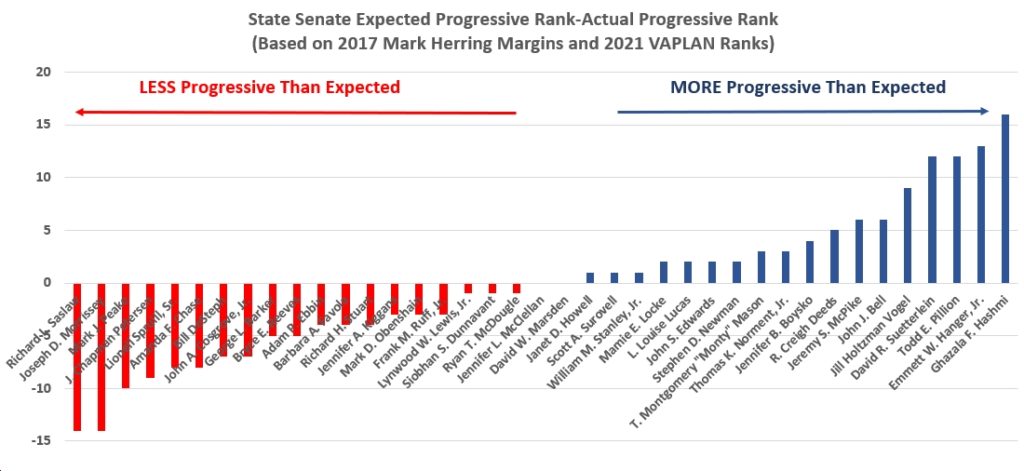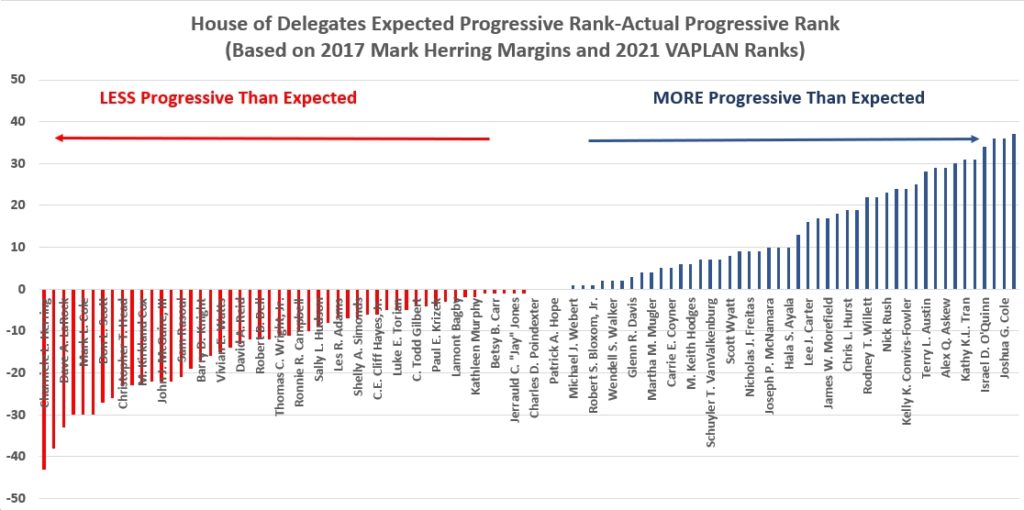Late yesterday, Cindy/VAPLAN came out with her eagerly anticipated, annual progressive scorecard for all Virginia General Assembly members. As always, there is a TON of information to digest in all of this, certainly given how much the 2021 Virginia General Assembly got done. Of course, as Cindy pointed out, there are numerous caveats to these scores, for instance that members “have different opportunities to vote on various bills, by virtue of the committee assignments they have.” I’d also add that different members have different roles, with those in leadership, for instance, not necessarily working to optimize their OWN scores, but instead (or at least somewhat) focusing on racking up wins for the “team.” Still, I think Cindy/VAPLAN do amazing work, and that it’s by far the definitive scorecard for the Virginia legislature.
With that, I wanted to compare the 2021 VAPLAN scores to district “leans,” along the lines of what Progressive Punch has been doing for years. Basically, the thinking is to try and measure how progressive a member’s voting record compared to how progressive one would have expected it to be (or that it COULD have been), all else being equal, based on the progressive “lean” of each member’s district. To measure the “lean,” I took the 2017 margin in each district for Mark Herring. I used that metric for a couple reasons, including that the district partisan spreads listed on VPAP didn’t seem to be at all accurate in several districts; and I wanted a relatively generic statewide race to compare things to, without a third-party candidate or strong “native son” effect (e.g., Northam in the Hampton Roads area). I then ranked the districts based on Mark Herring margins (giving an expected progressive rank), and compared those numbers to VAPLAN’s progressive rankings (giving the actual progressive rank). I then produced the following graphics, which show how much MORE or LESS progressive than one would expect based on district lean each member of the House of Delegates and State Senate ended up scoring in the 2021 General Assembly session.
With that, here are some highlights.
- In the State Senate, 19 members scored less progressive than expected based on their districts’ “leans,” while 18 members scored more progressive than expected based on their districts’ “leans.”
- Among Senate Democrats, the members who voted less progressively than their districts’ progressive “leans” would imply are: Senate Majority Leader Dick Saslaw (expected rank was 3, actual rank was 17, for a MINUS 14 score); Joe Morrissey (also MINUS 14); Chap Petersen (MINUS 9); Lionell Spruill (MINUS 8); George Barker (MINUS 5); Adam Ebbin (MINUS 4); Barbara Favola (MINUS 4); and Lynwood Lewis (MINUS 1).
- Among Senate Republicans, the members who voted less progressively than their districts’ progressive “leans” would imply are: Mark Peake (MINUS 10); Amanda Chase (MINUS 8); Bill DeSteph (MINUS 7); John Cosgrove (MINUS 7); Bryce Reeves (MINUS 5); Richard Stuart (MINUS 4); Jennifer Kiggans (MINUS 3); Mark Obenshain (MINUS 3); Frank Ruff (MINUS 3); Siobhan Dunnavant (MINUS 1); Ryan McDougle (MINUS 1).
- Among Senate Democrats, the members who voted more progressively than their districts’ progressive “leans” would imply were: Ghazala Hashmi (PLUS 16 – great job!); John Bell (PLUS 6); Jeremy McPike (PLUS 6); Creigh Deeds (PLUS 5); Jennifer Boysko (PLUS 4); Monty Mason (PLUS 3); John Edwards (PLUS 2); Louise Lucas (PLUS 2); Mamie Locke (PLUS 2); Scott Surovell (PLUS 1); Janet Howell (PLUS 1).
- Among Senate Republicans, the members who voted more progressively than their districts’ progressive “leans” would imply are: Emmett Hanger (PLUS 13); Todd Pillion (PLUS 12); David Suetterlein (PLUS 12); Jill Vogel (PLUS 9); Tommy Norment (PLUS 3); Steve Newman (PLUS 2); Bill Stanley (PLUS 1).
- Senators who voted *exactly* as their district leans would imply are: Jennifer McClellan and Dave Marsden.
- In the House of Delegates, 50 members scored less progressive than expected based on their districts’ “leans,” while 46 members scored more progressive than expected based on their districts’ “leans.”
- Among House of Delegates Democrats, the members who voted less progressively than their districts’ progressive “leans” would imply include: House Majority Leader Charniele Herring (expected rank based on district lean was 5, actual rank was 48, for a MINUS 43 score); Delores McQuinn (MINUS 38); David Bulova (MINUS 30); Jeion Ward (MINUS 30); Don Scott (MINUS 27); Mark Sickles (MINUS 26); Steve Heretick (MINUS 22); Sam Rasoul (MINUS 21); Karrie Delaney (MINUS 19); Vivian Watts (MINUS 15); David Reid (MINUS 13); Danica Roem (MINUS 12); Ibraheem Samirah (MINUS 12); Rip Sullivan (MINUS 10); etc.
- Among House of Delegates Republicans, the members who voted less progressively than their districts’ progressive “leans” would imply include: Dave LaRock (MINUS 33); Mark Cole (MINUS 30); Chris Head (MINUS 23); Emily Brewer (MINUS 23); Kirk Cox (MINUS 23); Bobby Orrock (MINUS 22); John McGuire (MINUS 22); Barry Knight (MINUS 17); Margaret Ransone (MINUS 16); Buddy Fowler (MINUS 14); Robert Bell (MINUS 12); Tommy Wright (MINUS 11); Jason Miyares (MINUS 11); Ronnie Campbell (MINUS 10); etc.
- Among House of Delegates Democrats, the members who voted more progressively than their districts’ progressive “leans” would imply include: Josh Cole (PLUS 36); Lashrecse Aird (PLUS 31); Kathy Tran (PLUS 31); Elizabeth Guzman (PLUS 30); Alex Askew (PLUS 29); Dawn Adams (PLUS 29); Dan Helmer (PLUS 25); Kelly Convirs-Fowler (PLUS 24); Nancy Guy (PLUS 22); Rodney Willett (PLUS 22); Cia Price (PLUS 19); Chris Hurst (PLUS 19); Candi King (PLUS 16); Lee Carter (PLUS 16); Angelia Williams Graves (PLUS 13); Hala Ayala (PLUS 10); etc.
- Among House of Delegates Republicans, the members who voted more progressively than their districts’ progressive “leans” would imply include: Jeffrey Campbell (PLUS 37); Terry Kilgore (PLUS 36); Israel O’Quinn (PLUS 34); Terry Austin (PLUS 28); William Wampler (PLUS 24); Nick Rush (PLUS 23); James Edmunds (PLUS 18); James Morefield (PLUS 17); John Avoli (PLUS 10); Joseph McNamara (PLUS 10); etc.
- Delegates who voted *exactly* as their district leans would imply are: Speaker Eileen Filler-Corn (D); Patrick Hope (D); Mike Mullin (D) and Charles Poindexter (R).
Anything else jump out at you?




















